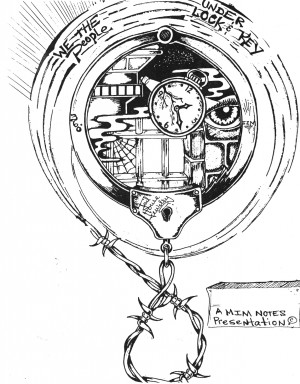Inmates Aren’t Slaves Or Are They?
 The MetroWest Daily News wrote an editorial titled Inmates Aren't Slaves.
The MetroWest Daily News wrote an editorial titled Inmates Aren't Slaves.
The tradition of prison inmates working menial jobs for meager pay dates back decades, long enough for “making license plates” to become a euphemism for going to jail.
Although prisoners are paid just pennies an hour for their work, it’s at least something, allowing them some money to purchase items from the prison canteen and helping lessen the burden on their family members who often financially support their locked-up loved ones. For some, working while incarcerated allows them to build up some small savings, giving them at least a chance to successfully re-enter society when they are released, which, after all, is part of the mission of any correctional system.
Bristol County Sheriff Thomas Hodgson would have the state remove that advantage from departing inmates and impose a greater burden on family members of remaining prisoners. Hodgson and state Rep. Elizabeth Poirier, R-North Attleboro, unveiled a bill Tuesday that would prohibit paying inmates for their work. Instead, prisoners would only receive time off their sentence – up to seven days a month – as payment for their work. Eliminating inmate pay would save the state between $2.5 million and $3 million a year, Hodgson claimed.
You know what would be better than paying inmates 2 cents an hour for their work? It would be NOT TO LOCK millions of people up in the first place!!
The editorial continues:
Indeed, the state would not be paying out that money in labor costs. But Hodgson conveniently neglects to mention what the commonwealth would lose if it stopped paying prisoners. Inmates at MCI-Cedar Junction, the state’s maximum-security prison, make every license plate affixed to every vehicle in Massachusetts. Without the cheap inmate work force, the state would have to contract with a private firm or hire new employees who would need to be paid livable wages, costing millions.
And license plates are just the beginning. Massachusetts Correctional Industries, or MassCor, is a major corporation, branching out into several industries. The Old Colony Correctional Center in Bridgewater, for example, houses a large print shop, providing discounted print jobs for state agencies, municipalities and private entities. Next door, at Massachusetts Treatment Center, inmates work in silk screen and sign shops, producing bumper stickers, business cards, street signs, city seals for police cars, etc. Inmates at MCI Framingham have been sewing American flags for more than a century. Other correctional facilities produce everything from trash barrels to beds, mattresses, eyeglasses and office furniture. MassCor even has a catalog to market its products, which generate a profit of more than $5 million a year. That doesn’t even count the savings to state agencies and municipalities, which would have to pay significantly more to purchase such products in the private sector.
While some inmates may continue to work solely to earn time off their sentence, that’s unlikely to be an incentive for many, especially those with long sentences who would barely notice the reduction. Without salaries, there would be no work force.
What is this? Under the guise of caring about prisoners’ human dignity and their professional development, this editorial board is actually making the case that it isn’t a good idea to stop paying prisoners for their work because it would adversely impact corporations and by extension the state of Massachusetts. This seems to be a more benign pro-exploitation of prisoner labor argument. The editorial board completely buys in to the prison industrial complex.
In response to this editorial, someone named Pat Ferris wrote a letter to the editor. This letter was incredibly depressing to read but I know that millions of Americans would agree with the sentiments expressed:
When early warning signs appear in young people by way of juvenile delinquency, the offender must be required to perform community service and be educated regarding the behaviors that got them into trouble in the first place. On that presumption it should be considered community service to work at some task during incarceration. Community service and working within the prison system should be a requirement if one becomes incarcerated. After all we are housing and feeding them, and if a person is not willing to work for food or shelter, they should go hungry and without a bed! [EMPHASIS MINE]
Slavery? On the contrary, more like “community service” and rehabilitation. I believe, and reason will bear this out, that this viewpoint which calls it slavery is a sign of the “viral” liberal mentality that has carried us so deeply into economic and social distress. The law was broken, a debt must be paid to society, and society must require certain criteria be fulfilled as part of an inmates rehabilitation.
We are a society of people who believe in the rule of law and that a citizen must pay a price for breaking the law. Incarceration alone does not rehabilitate, hard work and education are prerequisites that do.
God help us all…

By Bob Sloan, July 31, 2010 @ 11:33 am
Pat Ferris is missing the main point of the issue. Inmate labor – or “Community Service” – is well and good, however huge US Corporations have become involved in prison labor and use prisoners to manufacture their products more cheaply than China and other third world countries. Just because a law was broken does not mean the violator should be condemned to working long days so some US Corporation can make more and more profits. Check out the PIECP program and you’ll understand how the program has been diverted to slave labor – without our knowing it.